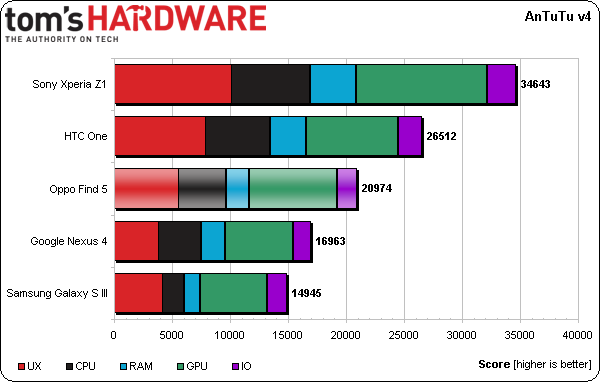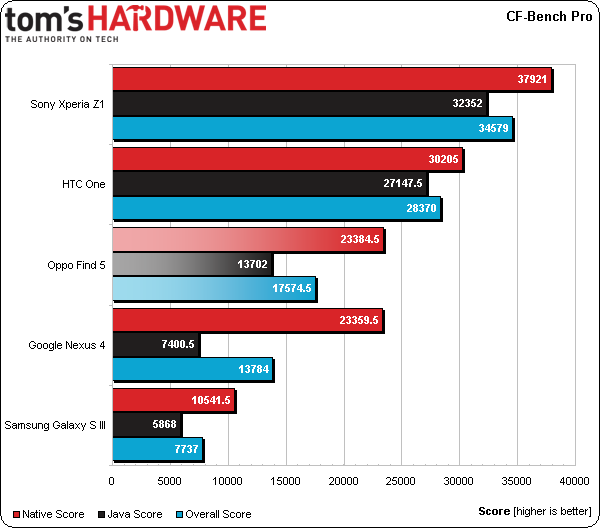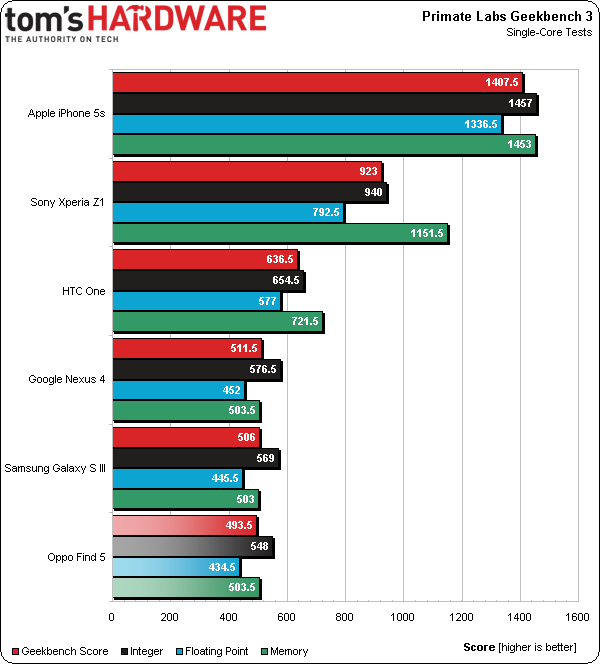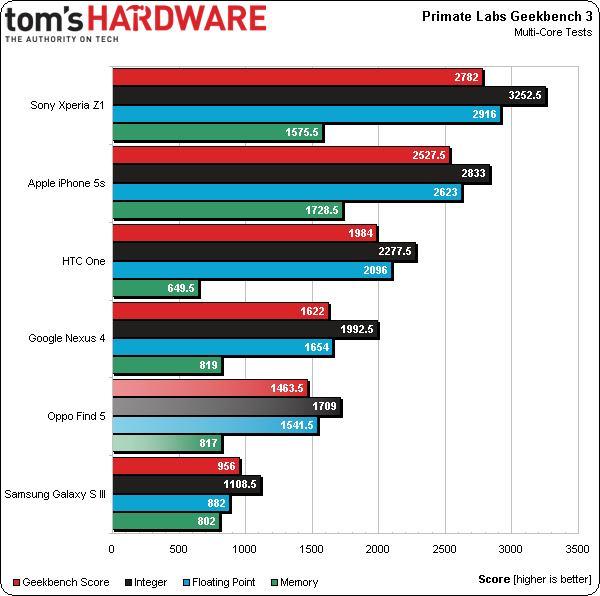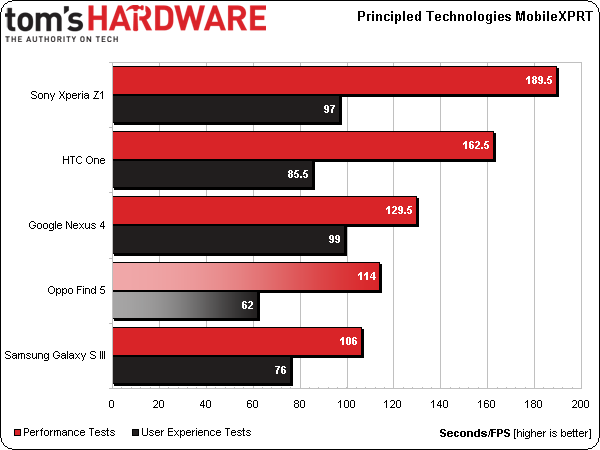Oppo Find 5 Review: A Phone Of Firsts From A Brand To Watch
Has a relatively unknown Chinese manufacturer of high-end home theater equipment actually created a flagship Android smartphone capable of going head to head with the industry's established heavyweights? We take Oppo's S4 Pro-powered Find 5 for a spin.
Results: System Tests
AnTuTu
AnTuTu is a benchmark designed to test the performance capabilities of four major aspects of mobile devices: Graphics (encompassing 2D, UI and basic 3D), CPU (fixed, floating-point, and threading), RAM (read and write), and I/O (read and write).
AnTuTu provides an apt demonstration of the Snapdragon SoC's performance, with the Find 5 being surpassed in all five categories by the more recent Snapdragon 600 and 800 processor included in the HTC One and Sony Xperia Z1, respectively. What comes as a surprise is the Nexus 4's lower performance, in particular the 4000-point gap between it and the Find 5. This may be attributed to the Nexus 4's known throttling context. Or perhaps our Find 5 has a higher-binned Snapdragon S4 Pro. It's hard to be sure beyond the devices we have seen and tested ourselves, but either scenario seems plausible.
CF-Bench Pro
Chainfire's CF-Bench Pro is designed to characterize the performance of multi-core systems by simulating Java loads, both in terms of natively-compiled and managed code. It tends to be a decent indicator of the tweaks that vendors make to Android hoping to eke out extra performance by optimizing for specific hardware features.
The results from CF-Bench Pro are very predictable, with Qualcomm's brand new Snapdragon 800 SoC comfortably outperforming its predecessors. It's also worth noting that the Nexus 4 seems to perform substantially slower on the Java side, which would seems to indicate that Oppo has optimized for Krait beyond the stock Android experience.
GeekBench 3
Primate Labs’ Geekbench is somewhat of an industry standard due to its comprehensive database and cross-platform compatibility, supporting x86 Windows, PPC and x86 Apple OS X, Linux, iOS, and Android. While Geekbench is more of CPU performance benchmark, it also covers some general memory performance. Geekbench’s approach is based on real-world applications and simulations of regular tasks, such as file/data manipulation, compression, encryption, and image processing.
Limited to a single core, the Oppo Find 5 perplexingly achieves the lowest overall score in GeekBench. With that said, the score is within five percent of the Nexus 4 and Samsung Galaxy S3, which is a reasonable margin of error for a mobile benchmark, in our experience. As always, when it comes to single-core performance, the A7's double-wide registers allow it to take a substantial lead in every test category.
Predictably, when multi-core performance is being tested, the dual-core A7 is bested by the quad-core Snapdragon 800. Meanwhile, at the lower end of the spectrum, the Nexus 4 and Find 5 find their legs, taking a comfortable lead over the Samsung Galaxy S3's older dual-core Krait-based CPU. The test also echoes the results from the single-core benchmark, with the Find 5 being marginally slower than the Nexus 4.
Get Tom's Hardware's best news and in-depth reviews, straight to your inbox.
MobileXPRT
Principled Technologies’ MobileXPRT is not dissimilar to certain aspects of GeekBench in that it simulates real world applications and use cases. It differs in two ways: first, it’s Android-only, and second, it simulates more modern workloads that GeekBench doesn’t, namely Biometrics (Facial Recognition), UX (List Scroll, Grid Scroll, Gallery Scroll, Browser Scroll, Zoom, and Pinch to Zoom), and Photo Management (Apply Photo Effects, Create Photo Collages, Create Slideshow, and Organize Photos).
The Find 5 is once again outperformed by the Nexus 4 in both categories of the MobileXPRT test. The most likely explanation for this is that whilst both phones run on Jelly Bean, the Nexus 4 is on Android 4.3, and can therefore take advantage of the Project Butter performance improvements included in that update. It’s also worth noting that the inclusion of HWCompose in Project Butter allows the Xperia Z1 to maintain a significant lead due to its Adreno 330 GPU.
Current page: Results: System Tests
Prev Page Test Setup And Benchmark Methodology Next Page Results: Graphics TestsTarun Iyer was a contributor for Tom's Hardware who wrote news covering a wide range of technology topics, including processors, graphics cards, cooling systems, and computer peripherals. He also covered tech trends such as the development of adaptive all-in-one PCs.
-
Mr Fender Hey guys, you forgot about their ColorOS - now it's basically the official firmware of OPPO Find5.Reply -
marclee37 I live in Hong Kong ssp, I see there are much many other China brand good looking good quality Android phones- 2gb ram is a norm, 3gb ram started to appear. 1080 screen, 5" screen, 13M cam, these are basic general spec, for price no more than US$320.Reply -
house70 Being unlocked, it is a perfect go-to phone for trips abroad. As far as hardware, the only "downside" is the lack of LTE bands in it's radio.Reply
SOftware is where it lacks, though. I got this because Oppo promised frequent updates to the OS, and TBH the Android-based variant it came with was not too bad of an experience. Then it became clear that the development team does not really know what they're doing (same minor but annoying bugs with every release, now barely coming through with 4.2, etc). They could have given CyanogenMod the kernel and drivers and let them pick up the development. CM-based ROMs are functional, but still plagued by bugs that come from lack of access to proprietary code.
Basically, their approach (at one point there were 2 or 3 versions of ROMs in development, none out of a beta state) stretched them way too thin, and it shows.
Last but not least, ignoring many requests of just embracing AOSP and let the plethora of apps do the rest was not a smart move on Oppo's part. -
danlw As an Audioholic, I have heard of the Oppo name. Their Blu-Ray players are considered by many in the high-end community to be top quality. In fact, Lexicon, a maker of ultra-elite electronics, actually stuck a $500 Oppo BDP-83 inside a new case and sold it for $3,500! (Audioholics: Lexicon BD-30 Blu-Ray Player (Oppo BDP-83 Clone) Review)Reply
With this phone, however, I doubt Apple will stick it inside their own chassis and call it ther own. It is mildly interesting, but as is often the case, forays into new market segments by otherwise high quality manufacturers are often precarious.
By all means, get an Oppo Blu-Ray player. As far as the phone, they need to get through their growing pains. -
programit Why isn't the phone compared to current versions of others. I see you put it against the latest iphone and a 16 month old dates Samsung S3. Why not the S4 or Note3 which are current models and hence what it is up against.Reply
It seemed a bit biased and not truly giving a comparison with current market phones. -
nebun got to love the iPhone 5s....like it or not....it's the best all around...the benches speak for themselves...did it mention "NO CRAPWARE and FAST OS UPDATES"Reply
